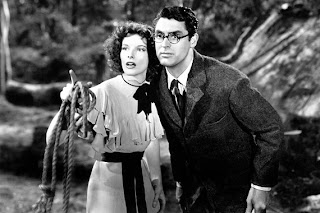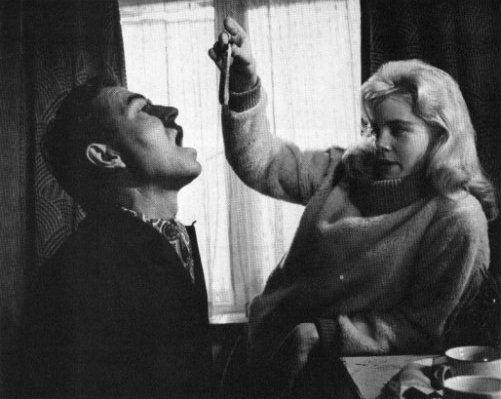(Consider this a work in progress for the next week or two, since I assume I'll need some time to remember things and fill in the gaps.)
My sample of 2011 films is hardly representative. I didn't get to a lot of films in theaters: the ones I've seen come mainly from Netflix, downloads, or (gasp!) TV. (The TV ones are mainly things that were on Showtime when I got the free three-month signup after moving to Cleveland; a few of these are actually some of my favorites of the year.) Incomplete though it may be, I figured it's December, so why not make an end-of-year list. One other thing: these aren't all necessarily 2011 films. I assume nobody cares, since I assume nobody is reading this.
Here's some movies I
wish I'd seen in 2011. Roughly in order of desire, and idiosyncratic as always:
- The Way Back (I really wish I'd seen this. Of course, I have no idea if it's actually good, but it sounded good)
- Take Shelter
- Drive
- The Interrupters
- Another Earth (but the more I heard about it, the less sure I was this would have been good)
- The Rum Diary
- Real Steel
- Beginners
- Rise of the Planet of the Apes (I'll watch any ape movie)
- A Dangerous Method (Not sure if good, but Michael Fassbender is in it)
- Shame (again, Fassbender)
- Project Nim (ape movie)
- Green Hornet
And, movies I wish I hadn't seen:
- Source Code (2011) Why, god, why?? Was this movie really released in 2011? My brain seems to have buried it so far down it feels like three years ago. I can't really do a Worst Movie of 2011 category, since I generally try to avoid watching the bad movies to begin with, but out the ones I've seen, this one wins.
- Mac and Me (1988) I thought it'd be funny, as a joke -- so bad it's good. Turns out it's just bad. Bad.
Finally, here are the movies I'm glad I saw. This isn't a list of all the movies I've seen this year, obviously. It's just a list of the ones I think are worth mentioning.
Terry's Best Films of 2011:
- The Tree of Life (2011) Classic. Possibly one of the best movies I've seen. I'm still withholding judgment, but signs point to yes.
- The Road (2009) Classic. Maybe the saddest move ever. It's not perfect, but I love this movie.
- Inglourious Basterds (2010) Classic. Great script, great performances.
- Midnight in Paris (2011) I love the fact that this movie doesn't need to explain itself. And I love the 10-second scene where the detective is lost in Louis XIV's France.
- Sullivan's Travels (1942) See my review. Definitely a classic.
- Win Win (2011) Paul Giametti is so hot right now. I don't always like him, but I loved this movie. The kid actor is great, P.G. is great, Amy Ryan is great. It's not really a sports movie, but it is, and it's one of those movies where you can't help but root for the protagonist.
- Tron: Legacy (2010) First, I really wanted to see this. Then I heard it sucked, and I avoided it. Finally, it was on Showtime, so I recorded it. I has flaws -- mainly in being overly ambitious -- but it rocks. I was a Tron fan, and now I'm a Tron: Legacy fan.
- Of Gods and Men (2010) Tense, emotional, based-on-real-life, drama about Christian monks facing religious violence in Muslim Algeria.
- Croupier (1998) I love Clive Owen, and after watching Doctor Who, I now love Alex Kingston. And we all love Vegas movies, even if they if they take place in South Africa.
- Dogtooth (2009) Totally insane bloody cat murder.
- The Squid and the Whale (2005) Took me a while, but I finally saw this. Flawed and pretentious, but a good movie in the end.
- Star Trek: Nemesis (2002) One of the TV movies that I just finally watched this year. It's Star Trek.
- Hot Tub Time Machine (2010) Some off-putting homo jokes, but an instant classic in the time-travel comedy genre.
- Jack Goes Boating (2010) This movie has the feel of a mid-90's indie drama. I'm not as infatuated with PSH as others are, but he's pretty damn good in this movie. (Also, see Before The Devil Knows You're Dead.) Also, some people call this a romantic comedy. It's funny sometimes, but it's not a comedy. And yes, I love Amy Ryan.
Below, some random awards.
Best Sound Mixing
Tron 2 gets the nod for sound mixing (or is it sound editing? idk). There are numerous scenes where focus shifts between outside and inside (e.g. Flynn's arcade, when the jukebox kicks on on the game floor, and Flynn Jr. moves from there to upstairs then to the secret room; or the games scene which shifts between various game platforms and Clu's luxury box). Maybe it seems like a minor thing, but the way the sound shifts with the camera really helps move the action along with it.
Best Visual Effects
The Road. Imagine that the sun has been blotted out, and all life on earth is dying. If you're going to take
The Road seriously as a movie, then you have to buy in to this premise. Fortunately, every scene in this movie visually convincingly conveys that idea. I heard they filmed parts of it on the slopes of Mount St. Helens, to get that fields-of-dead-trees effect. Watching a film that is unceasingly gray is not exactly fun, but it's not supposed to be. That's the point.
Best Soundtrack
Best soundtrack of the year goes to Daft Punk for Tron: Legacy. (That colon makes the title hard to parse in a sentence, so I'll call it Tron 2.) It is
far from a perfect soundtrack, but it is objectively awesome. My main complaint is that it is repetitive (of course, the movie is too damn long, so any soundtrack is going to get repetitive trying to fill all that space). Also, it is relentless. Despite being just over two hours long (hmm, it felt longer), Tron 2 never takes a break. Daft Punk's soundtrack is continually thumping.
Best Animated Short
The Eagleman Stag. I am absolutely not qualified to make a selection for this type of category, but since I watched the animated shorts presentation at the Ann Arbor film festival, I'm going to. This is an utterly engrossing short. The animation is entirely black-and-white, so that everything feels like it's been folded out of printer paper, and there's no dialogue, only voice-over. The story isn't confusing; it's about confusion. I think it's great.
Best Actress
Amy Ryan? Gosh, is she the only real actress in any of the movies I have listed? Either there aren't enough good roles for women, or I don't watch enough of the movies with strong women characters. I guess I could add
The Kids are All Right to my list, and then nominate Julianne Moore... Alex Kingston was good, I guess.
Best Actor
I'm tempted to give this to Brad Pitt for
The Tree of Life and
Inglourious Basterds. What a combo. Those two movies definitely show some range, but neither one on its own is really a best-actor performance.
Best Screenplay
Inglourious Basterds.
Best Director
Terrence Malick,
The Tree of Life. I'm not sure exactly what directing this movie entails, honestly. There's some crazy shit in here, though, and I'm assuming it all comes out of Terrence Malick's brain. I can only hope that the CG scenes in this movie stand the test of time, because if they do this movie will eventually get on some seriously-great-movie lists.
Best Film
The Tree of Life.












